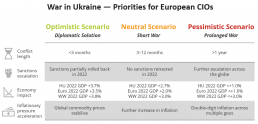We watch the unfolding situation in Ukraine with a shared horror. The humanitarian effects of the Russian invasion are clear, and most European countries are receiving many refugees. However, there are impacts beyond the fundamental crime against the people of that country. Sanctions and economic uncertainty are having an effect on the world, and CIOs in Europe must once again prepare to manage through a period of change. At IDC my colleagues have produced their latest view on this — Russia-Ukraine War: Risk Assessment and Guidance for CIOs and Technology Leaders — and in this blog I’d like to take some themes from that and explore how we can stay ahead of the curve.
First of all, it is often tempting to view these things in isolation. There are many ramifications of the current situation on businesses. However, we are living in an extremely uncertain time. We have the impact of accelerating climate change, of migration caused by this (among other things), of the COVID-19 pandemic (which is far from over) and of geopolitical changes such as Brexit. These issues interact and sometimes magnify their effects as they do so. It’s very difficult to make predictions or long-term plans in this environment.
So, what are the issues at hand for digital leaders? We cannot know how long this conflict will last or if and how it will spread beyond Ukraine’s borders. At IDC we have prepared various scenarios, pessimistic through to optimistic, and our forecasts are based on these models.
This chart shows the likely economic impact of these scenarios and of course will be updated as time goes on. The inflationary pressures that could arise will undoubtedly cause companies to pause or delay projects as prices increase. We are already seeing prices rise by 10% in Poland and digital work from Ukraine and Russia being transferred to that country, creating skills shortages. Prioritisation and risk around costs and availability of people will be activities to be undertaken as soon as possible. Many companies have development teams in Ukraine either directly or outsourced. Some of those teams will have to be replaced in the short term at least, adding to an already overheated market for developers. Risks to successful projects should be reviewed more regularly in this situation.
Every CIO will also be aware of the need for an increased focus on information security. Cyber warfare is a fact of life in the 21st century, although many observers have been surprised at the limited nature of this aspect since the start of the invasion. Throughout Europe, governments have provided guidance on heightened alert around this subject. In the UK, the National Cyber Security Centre, which I find is one of the most effective communicators on this subject, has encouraged companies to reassess their risk around things like zero day vulnerabilities in widely used services which could be a target for state actors at this time. It is entirely possible to be affected as a by-product of this conflict. Don’t neglect your key suppliers — work with them to reduce the risk across the board.
The final area that I will mention in this blog is that of leadership and communication. Many people in your teams will be affected, either directly with families or friends involved or indirectly. The need to communicate with your teams in a much more frequent manner, to give them the time and space to handle their own response and provide support where it is needed, is paramount. More than any other time, be excellent at communication now. Be decisive and clear about how and when you will provide updates on the organisational situation, including the channels you will use. This applies to communications to the teams in the business and the board.
Our analysts will continue to monitor the situation and we will share research where it is possible to do so in our LinkedIn group. You can apply to join the IDC community using this link: https://www.linkedin.com/groups/8992748/.
As always, our focus is on providing value to our clients and our community. If you have a question or something to share, please get in touch.



